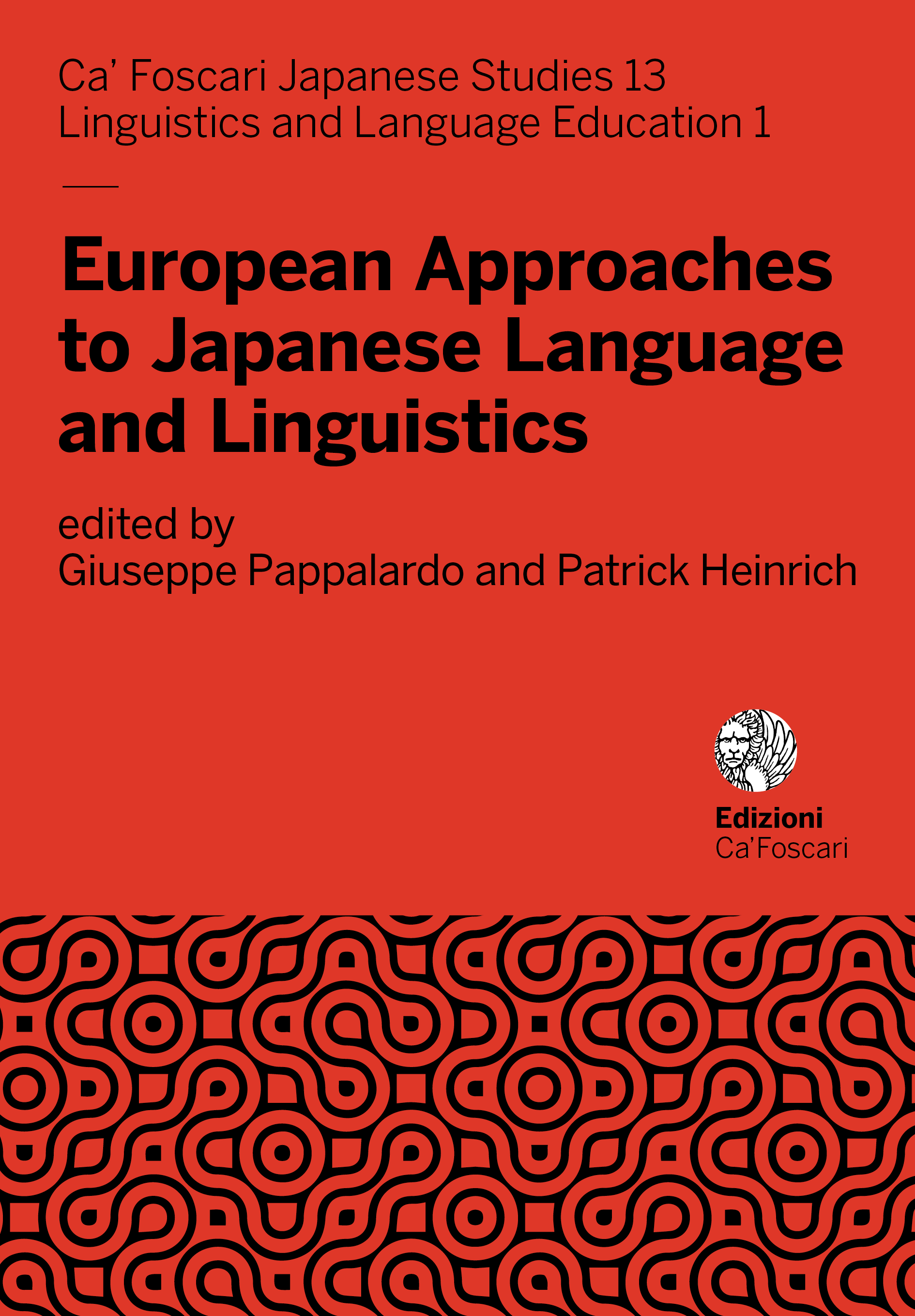Collana |
Ca’ Foscari Japanese Studies
Volume 13 | Miscellanea | European Approaches to Japanese Language and Linguistics
European Approaches to Japanese Language and Linguistics
open access | peer reviewed-
a cura di
- Giuseppe Pappalardo - Università Ca’ Foscari Venezia, Italia - email
- Patrick Heinrich - Università Ca’ Foscari Venezia, Italia - email orcid profile
Abstract
In this volume European specialists of Japanese language present new and original research into Japanese language over a wide spectrum of topics which include descriptive, sociolinguistic, pragmatic and didactic accounts. The articles share a focus on contemporary issues and adopt new approaches to the study of Japanese that often are specific to European traditions of language study. The articles address an audience that includes both Japanese Studies and Linguistics. They are representative of the wide range of topics that are currently studied in European universities, and they address scholars and students alike.
Keywords Discourse analysis • Teaching Japanese prosody • Finland • Reading ability • Japanese phonetics • Morphosyntax • Japanese impoliteness • Corpus linguistics • Teaching strategies • Metalanguage • Japanese Language Education • Adjectives • Kokugaku philology • Language criticism • Linguistic relativity • Upper secondary school • Lenition • Motion event description • Spontaneous talk • Gesture • Kanji competence • Italian • Late Middle Japanese • Segmental Structure • Queer speech • Phonology • Vowel devoicing • Subtitling • Inherent segment duration • Japanese • Moraic isochrony • Worldview • Language Education Policy • Japanese dialects • Kanji strings • English-Japanese bilinguals • Kagoshima Japanese • Keigo • Audiovisual translation • Multilingualism • Relative clauses • Pragma-linguistics • Ainu • Linguistic landscape • Talmy’s typology • pitch accent • Noun incorporation • Pragmatics • Pitch accent • Teaching Japanese pronunciation • Japanese written language • Complement clauses • Spoken corpora • Theory • Durational compensation • Gender • Japanese language • Context-driven methodology • Personal pronouns • Thinking-for-Speaking • France
Permalink http://doi.org/10.30687/978-88-6969-428-8 | e-ISBN 978-88-6969-428-8 | ISBN (PRINT) 978-88-6969-429-5 | Numero pagine 252 | Dimensioni 16x23cm | Pubblicato 03 Luglio 2020 | Lingua en
Copyright © 2020 Giuseppe Pappalardo, Patrick Heinrich. This is an open-access work distributed under the terms of the Creative Commons Attribution License (CC BY). The use, distribution or reproduction is permitted, provided that the original author(s) and the copyright owner(s) are credited and that the original publication is cited, in accordance with accepted academic practice. The license allows for commercial use. No use, distribution or reproduction is permitted which does not comply with these terms.
- Introduction
- 03 Luglio 2020
Research Papers
-
Syllable Weakening in Kagoshima Japanese
An Element-Based Analysis - 03 Luglio 2020
-
Thinking-for-Speaking to Describe Motion Events
English-Japanese bilinguals’ L1 English and L2 Japanese Speech and Gesture - 03 Luglio 2020
- Strategies of Impoliteness in Japanese Spontaneous Talks
- 03 Luglio 2020
-
Ideological Manipulation in Interlingual Subtitling
The Japanese-Italian Translation of a nyūhāfu Genderlect in the Movie Close-Knit by Ogigami Naoko - 03 Luglio 2020
- Corpus Linguistics as a Tool for Metapragmatics in Japan
- 03 Luglio 2020
-
Stirring the ‘Language Policy Soup’
Japanese in Language Education Policies in France and Finland - 03 Luglio 2020
Miscellaneous
-
L’esprit de celui qui parle
Wilhelm von Humboldt on Japanese and its Speakers - 03 Luglio 2020
-
New Approach to Teaching Japanese Pronunciation in the Digital Era
Challenges and Practices - 03 Luglio 2020
-
The Role of the Japanese Language in Venice
A Multidisciplinary Perspective on Japanese Linguistic Landscape - 03 Luglio 2020
- A Consideration About Competence in Kanji and their Teaching
- 03 Luglio 2020
